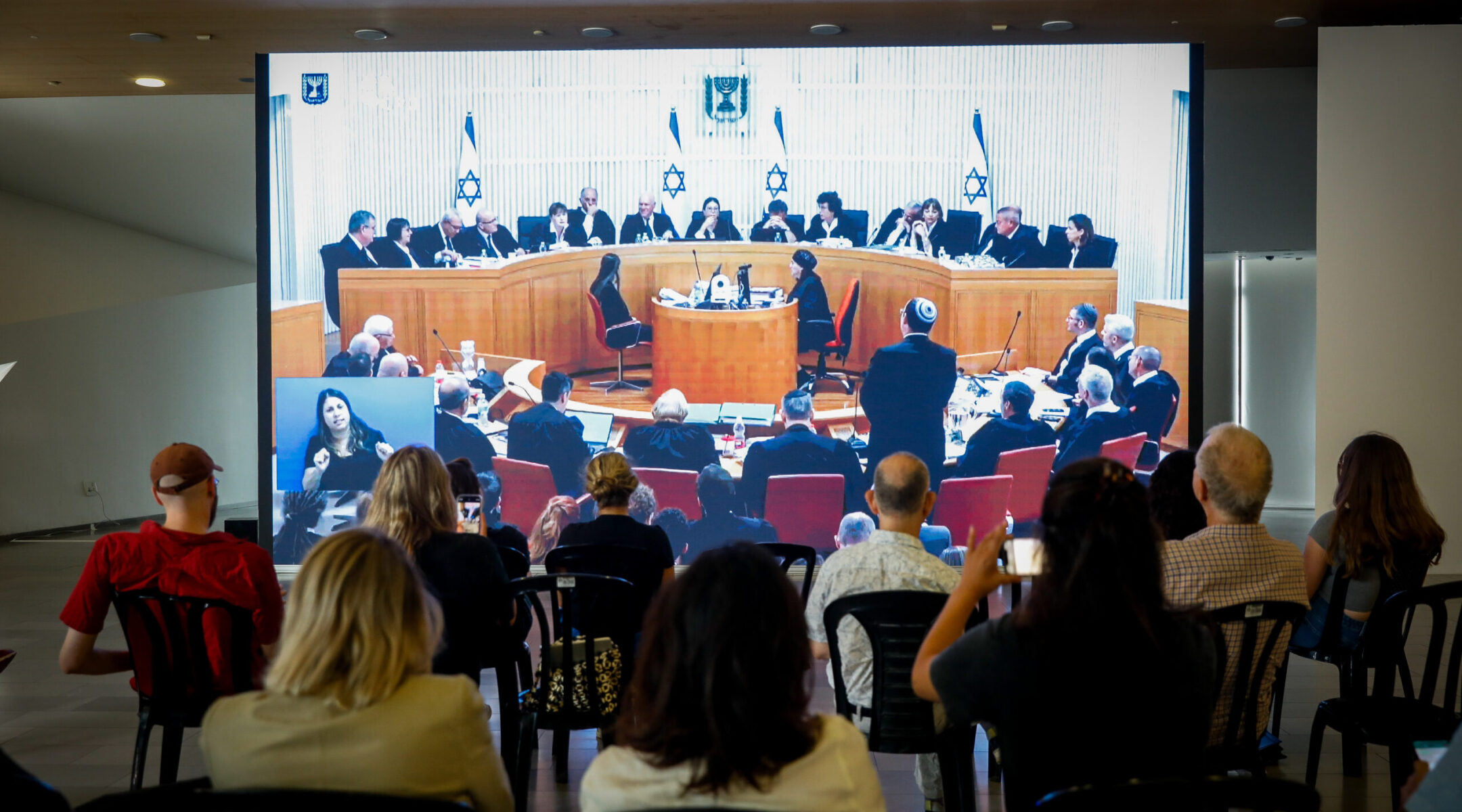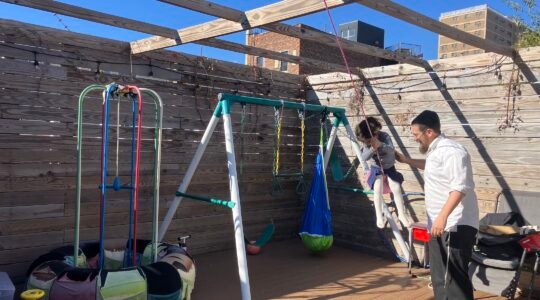(JTA) — For almost nine months, Israelis have been fighting over the future of their Supreme Court. Today, that battle has moved into the Supreme Court itself.
In July, Israel’s hardline right-wing governing coalition passed a law to weaken the court. Opponents of the law then filed legal challenges against it. That put the court in the uncomfortable, and unprecedented, position of ruling on itself: It can decide to uphold the law, strike it down, or send it back to parliament to be amended.
When Israelis on both sides of the debate warned that the country was headed to a constitutional crisis, this is what they meant. Today’s hearing is raising questions no one knows the answer to: What happens if the court strikes down the law, and the government doesn’t respect the court’s ruling? Who takes precedence — the court or the coalition?
For weeks, Israelis have been fiercely debating that question — and even members of Prime Minister Benjamin Netanyahu’s government are split on the issue. And while a decision won’t be handed down today (it could take four months), matters are already coming to a head on Israel’s streets, and in its halls of power.
While the Supreme Court’s activities are often closely watched, today’s hearing appears to be riveting many of the Israelis who have been fighting over the legislation on trial. Renewed protests in Jerusalem, where the court meets, flooded streets on Monday, and in a sign of hearing’s reach, the Tel Aviv Museum of Art waived admission fees and is showing a livestream of the court proceedings today.
Here’s what you need to know.
How did we get here?
Soon after Netanyahu’s government came to power, it unveiled a sweeping plan to limit the power of Israel’s judiciary. The Israeli right sees the courts as an unelected bastion of left-wing Ashkenazi secular elites that stymies the right-wing government from passing laws that reflect the will of the electorate.
The plan, in its original form, would have given the governing coalition complete control over the appointment of judges. It also would have let Israel’s parliament, the Knesset, override Supreme Court decisions with a bare majority, among other provisions.
That plan sparked a historic protest movement that has brought hundreds of thousands of people to the streets to oppose the law. The protesters say the judicial overhaul will undermine Israeli democracy by removing the most significant check on the power of the government and by leaving minorities vulnerable to discriminatory laws. In addition to the protesters, world leaders including President Joe Biden have come out against the overhaul, as have large Jewish groups in the United States.
In July, after failed negotiations over the plan and months of civil unrest, the Knesset passed one component of the overhaul along party lines. The law barred the Supreme Court from striking down government decisions it deems unreasonable — a tool the court had used to check the government’s power.
What’s the Supreme Court’s role in the controversy?
One of the roles of Israel’s Supreme Court is to hear petitions against laws that, their opponents say, are unconstitutional. Israel doesn’t have a constitution, but it does have a set of “Basic Laws” that act as a kind of substitute.
Soon after the “Reasonableness” law was passed, a handful of good-government groups and professional guilds submitted petitions against it, arguing that it undermines Israel’s democratic system or that there were procedural problems with its passage. The Supreme Court agreed to hear the petitions all together during the hearing today.
But here’s the twist: The law that was just passed is itself a Basic Law. The Supreme Court has never struck one of those down. That’s one of the main reasons why Netanyahu and his allies are saying the law needs to be upheld.
But opponents of the law note that the process for passing a Basic Law is no different than the process of passing an ordinary law. Therefore, they say, the law shouldn’t be immune from judicial review.
The court is hearing the arguments today — and early signs indicate its sympathy to the government’s opponents. In court today, several justices are arguing strenuously that just because they haven’t struck down a Basic Law before, they have the right to review laws designated as such. They said their power to do so rests in the country’s Declaration of Independence, which has taken on increased symbolic weight during the political fight.
The court must render a decision by Jan. 16 — either dismissing the petitions, sending the law back to Knesset for revision or striking it down. And in parallel, Netanyahu and his opponents are again negotiating over a compromise on the remaining overhaul legislation that has not yet passed.
Why are the stakes of one court decision being seen as so high?
Israelis on the right and left are attaching so much significance to the court hearing — and the resultant decision — because they agree on one thing: This is about way more than the “reasonableness law.” This is about the future of Israeli democracy.
In recognition of the hearing’s gravity, all 15 justices on the Supreme Court will hear the petition — the first time that has ever happened. The justices have also received added security.
On the right, supporters of the law say that the Supreme Court would be breaking with precedent, and further overstepping its bounds, by striking down a Basic Law. On the left, opponents of the law feel the court is the final bulwark of liberal democracy in Israel. In another sign of the unusual times, Israeli Attorney General Gali Baharav-Miara (whose position, unlike in the United States, is independent of the governing coalition), has publicly sided with the petitions against the law. She is sitting out the hearing because of her public stance.
Dueling protests have taken to the streets, and politicians have issued dire statements. But they’re not only disagreeing over whether the law is legitimate — they’re divided over what should happen if the court strikes the law down.
What happens if the court strikes the law down?
If the court says the law is unconstitutional, the coalition that passed it would have to decide whether to obey the court or not. If it were to obey the court, it would be delivering a major blow to its base, who would see a law limiting the Supreme Court’s overreach stricken down by that very same court.
But if the coalition were to defy the court, it would mean a major break with precedent, and would trigger a constitutional crisis — where different branches of the government conflict with each other, and the state lacks laws to resolve the dispute.
That’s why some of Netanyahu’s most senior allies have gone public saying that the government has a fundamental duty to respect court decisions. Defense Minister Yoav Gallant, who has tried to act as a moderating force on the judicial overhaul, said, “The State of Israel is a democratic country with a rule of law. I will honor any Supreme Court ruling,”
Other Netanyahu allies have taken the opposite tack. Knesset Speaker Amir Ohana gave a speech last week in which he said the court has no right to strike down Basic Laws and, if it does so, would be acting “against the Knesset and against Israeli democracy.”
Netanyahu, in interviews, has remained noncommittal about whether he would respect a court ruling striking down the law. But he retweeted Ohana’s video.
JTA has documented Jewish history in real-time for over a century. Keep our journalism strong by joining us in supporting independent, award-winning reporting.






